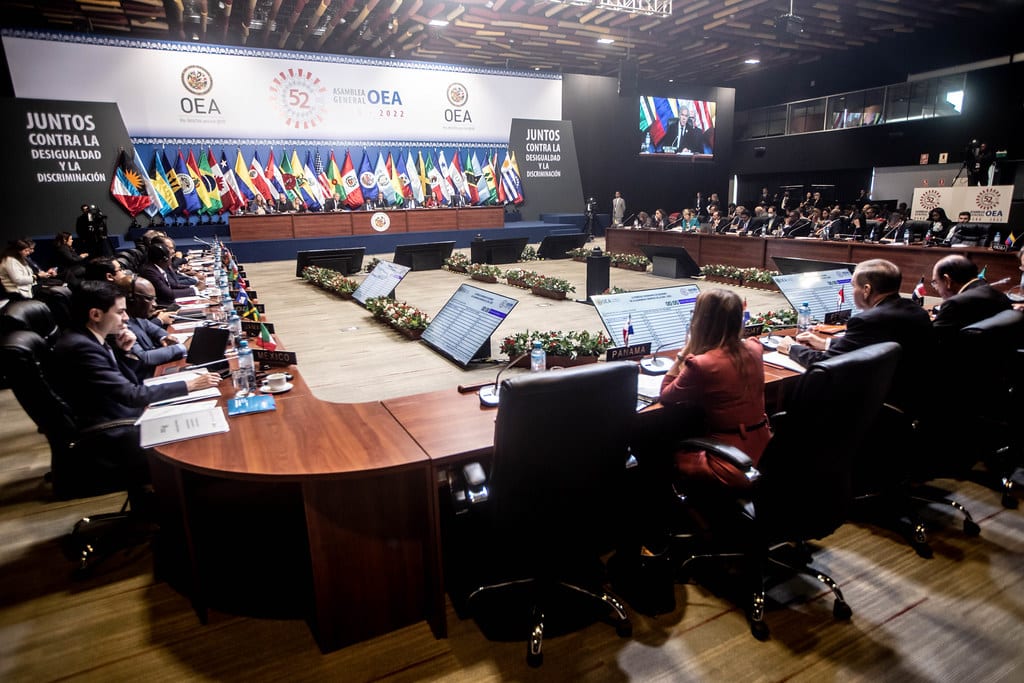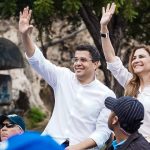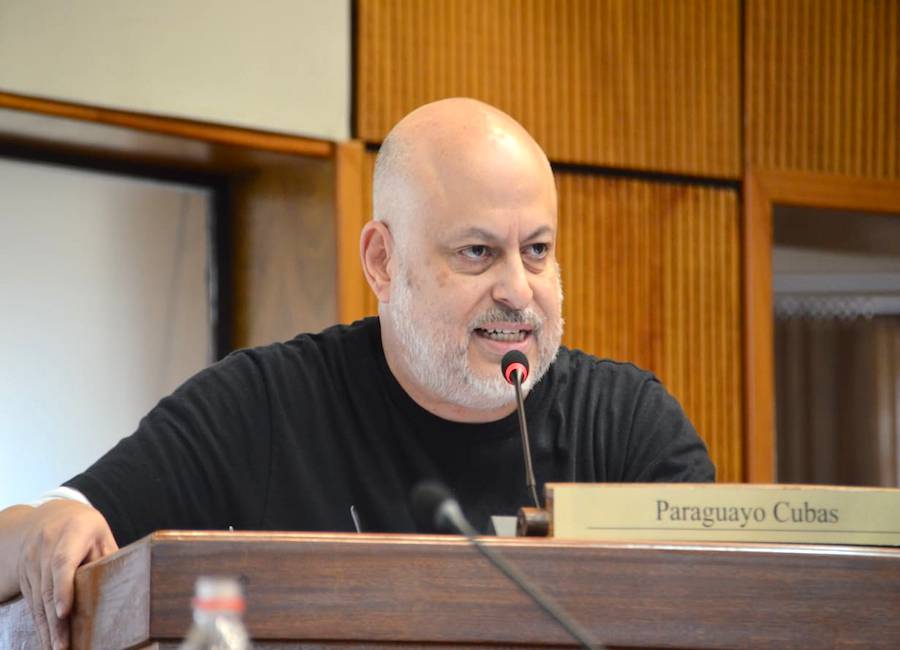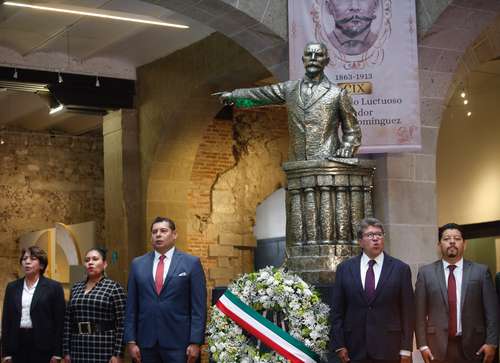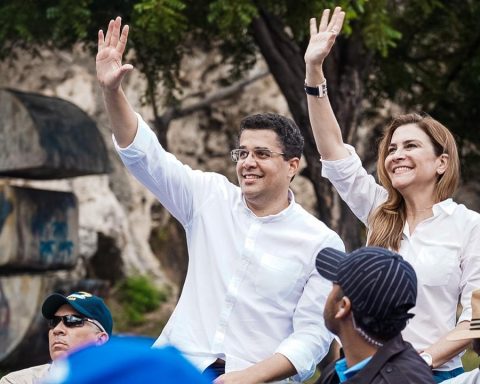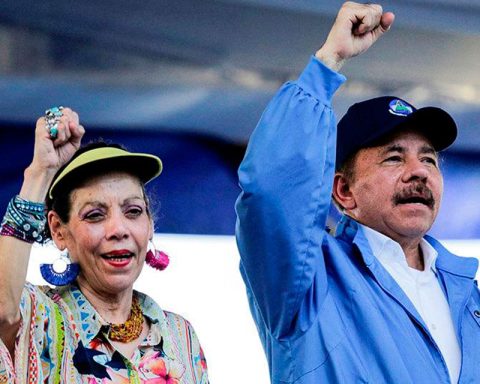The General Assembly of Foreign Ministers of the Organization of American States (OAS) approved, for the fourth consecutive year, a resolution against the regime of Daniel Ortega and Rosario Murillo. The text, approved this Friday, October 7, sues the dictatorship release “immediately all political prisoners” and “stop the repression and arbitrary detention of the leaders of the Catholic Church.”
The document approved by acclamation was a proposal from the delegations of Antigua and Barbuda, Canada, Chile, Costa Rica and the United States. These same countries requested, last August, include “the situation in Nicaragua” on the agenda of the 52nd General Assembly of the OAS, which ended this Friday in Lima, Peru.
In its first point, the States urge “the Government of Nicaragua to cease all violent action against the population of the country and to fully restore civic and political rights, religious freedoms and the rule of law.”
In addition, “to end the intimidation and judicial, administrative and other harassment against journalists, especially women journalists, and against the media, and non-governmental organizations.”
From November 2018 to date, the Ortega dictatorship has closed 2,281 NGOs; of these, 2,207 have been eliminated so far in 2022, according to a data analysis by CONFIDENTIAL. In addition, during his four consecutive governments, Ortega it has closed 54 media outlets.
The resolution also calls on the regime to “cease the repression and arbitrary detention of the leaders of the Catholic Church and to guarantee the right to religious freedom for everyone in the country.”
On this point, the countries also declared themselves “deeply concerned” about the “arbitrary detention” of Bishop Rolando Álvarez and eight other clericsas well as “for the oppression, criminalization, harassment, police harassment and acts of repression that the Government of Nicaragua has perpetrated against members of the Roman Catholic Church, and the arbitrary expulsion of religious congregations.”
Demand the release of political prisoners
In the second point of the resolution, the States demand that the regime “immediately release all political prisoners, in compliance with the decisions and recommendations of the Inter-American Court of Human Rights and the Inter-American Commission on Human Rights.”
In the same point, they request “the Government of Nicaragua to guarantee the physical, mental and moral integrity and the right to life of all the people who have been arbitrarily detained.”
From mid-2018 to date, the OAS has approved 15 resolutions on the situation in Nicaragua. Voting has taken place in the two main instances of the regional organization: the General Assembly of foreign ministers (five) and the Permanent Council (ten).
Although there have been five General Assembly resolutions, only the last four have called for an end to the repression and the release of political prisoners. The first resolution, approved on June 5, 2018, is the only one that has not required a vote, since it was presented by “consensus”. It condemned violence in general, but there was no direct reference to the responsibility of the regime in the attacks against the population.
At the last General Assembly, last November, 25 countries declared voting “without legitimacy” on November 7, 2021, in which Ortega was re-elected for the fourth consecutive time, without political competition and without democratic guarantees.
Costa Rica Demands Regional Actions
The permanent representative of Costa Rica in the OAS, Ambassador Alejandra Solano, celebrated the approval of the resolution on Nicaragua and demanded the implementation of “joint action” in the region to provide protection to Nicaraguans who have been forced to leave the country. country.
The situation in Nicaragua has caused “a serious humanitarian crisis,” Ambassador Solano warned. “Thousands of Nicaraguans have been forced to leave the country and thousands of them today find refuge in my country, in Costa Rica. Costa Rica will keep its doors open to those who need it, but we also require, as a region, joint action, shared responsibility, to provide these people with protection and decent living conditions, but also that they have the possibility of an eventual return. ”, he stressed.
The Costa Rican ambassador also urged the Government of Nicaragua to “unrestrictedly respect” its international obligations assumed in a free and sovereign manner, particularly in the area of human rights.
Inter-American Court points out contempt of Nicaragua
Hours earlier, the president of the Inter-American Court of Human Rights (IA Court), Judge Ricardo Pérez Manrique, stated during his speech at the 52nd General Assembly of the OAS, that the Government of Nicaragua refuses to comply with the resolutions issued by that court.
The Inter-American Court has proven to be an “open court”, but the Nicaraguan regime maintains its position of not abiding by any of the resolutions adopted by that body in favor of political prisoners in the Central American country.
?URGENT| President of the @CorteIDH dr @rcperezmanrique presents annual report 2021 of the @CorteIDH in the fourth plenary session of the 52nd General Assembly of the @OEA_oficial and expresses great concern about the serious human rights crisis in Nicaragua. pic.twitter.com/tVjmwY9CJU
— Cenidh (@cenidh) October 7, 2022
“The plenary session of the Court has resolved to communicate to this General Assembly its concern about the situation of human rights in Nicaragua (…) The court has issued several decisions, such as this one, and declared the State of Nicaragua in a situation of contempt before the Inter-American System,” Judge Pérez Manrique said.
